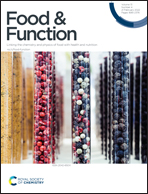Butyl-fructooligosaccharides modulate gut microbiota in healthy mice and ameliorate ulcerative colitis in a DSS-induced model†
Abstract
Butyl-fructooligosaccharides (B-FOSs) are newly synthesized prebiotics composed of short-chain FOS (GF2, 1-kestose; GF3, nystose; GF4, fructofuranosyl-nystose; GF5, 1-F-(1-b-D-fructofuranosyl)-2-nystose) bound with one or two butyric groups by ester bonds. Previous in vitro studies have shown that B-FOS treatment increases butyrate production and protects the growth of butyrate-producing bacteria during fermentation. The aim of this study was to further test B-FOS as a novel prebiotic compound by evaluating the effect of B-FOS on gut microbiota via 16S rRNA metagenomic analysis in an Institute of Cancer Research (ICR) mouse model and examining its anti-inflammatory efficacy in a mouse model of colitis induced by dextran sodium sulphate (DSS). In the healthy ICR mouse study, linear discriminant analysis effect size results revealed that Bifidobacterium was the representative phylotype in the B-FOS treatment compared to the control group. Furthermore, the cecal butyrate concentration of the B-FOS group was significantly higher than that of the control (P < 0.05). The high concentration of butyrate in the B-FOS treatment was probably associated with the high relative abundance of clusters of orthologous group (COG) 4770 (acetyl/propionyl-CoA carboxylase). In the DSS-induced infection study, B-FOS significantly ameliorated the symptoms of DSS-induced colitis, increased the mRNA expression of occludin, decreased tumor necrosis factor-α (TNF-α), interferon-γ (IFN-γ) and interleukin (IL-8) in the colon tissues, and significantly increased cecal butyrate concentrations. These findings suggest that B-FOS ameliorated DSS-induced colitis by maintaining the epithelial barrier and reducing the secretion of inflammation related cytokines.



 Please wait while we load your content...
Please wait while we load your content...